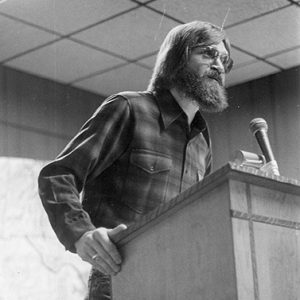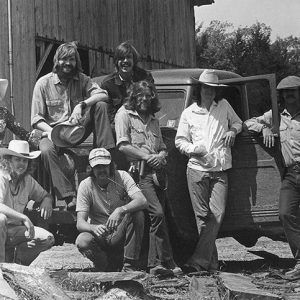calsfoundation@cals.org
Edd Jeffords (1945–2002)
Edd Jeffords was one of the most visible figures in the Arkansas counter-culture movement centered in Eureka Springs (Carroll County) during the 1970s. In addition to organizing—along with Bill O’Neill and a host of others—the Ozark Mountain Folk Fair in 1973, Jeffords founded the Ozark Access Catalog, organized the Conference on Ozark In-Migration, and created the Ozark Institute (OI).
Edd Jeffords was born in Rector (Clay County) on November 28, 1945, to Roy and Sylvia Jeffords; he had three sisters and one brother. After his father died and his mother fell into poor health, Jeffords moved to Washington State, where he graduated from high school in 1963. From 1963 to 1967, Jeffords served in the U.S. Air Force, working in public information and intelligence. He then studied journalism. Until 1972, Jeffords worked in the news world of the Pacific Northwest, moving to Tacoma, Washington, to become the fine arts editor for the Tacoma News Tribune.
In 1972, Jeffords and his wife, Linda Jeffords, moved back Arkansas, landing in the artistic hub of Eureka Springs. Jeffords continued working as a journalist, writing for the Eureka Springs Times-Echo and a few other local papers, focusing in particular on the problems of pollution in the town’s iconic healing springs. This put him at odds with notable Eureka Springs establishment figures John Cross and newcomer Gerald L. K. Smith. Smith resented Jeffords’s reporting, fearing it detracted from Smith’s ability to create a tourist haven based on his new Great Passion Play. Ultimately, Smith’s influence was strong enough to push Jeffords out of the main journalistic avenues in the county.
In 1972, Jeffords created the Ozark Access Catalog (OAC) with two friends from the Pacific Northwest, Frank Egan and Bill O’Neill. It lasted until 1974. Inspired by Stewart Brand’s Whole Earth publications, the OAC collected and disseminated all the ideas, lessons, and access to tools and knowledge needed for becoming a homesteader in the Ozark Mountains. Despite the short run of the OAC, it served as a launching ground for other notable back-to-the-landers in the Ozarks. Perhaps the best-known among these was Joel Davidson, who had moved from California and, at Jeffords’s urging, began investigating using solar technologies on his small homestead near Pettigrew (Madison County) in order to write about it for the OAC; he would later become nationally recognized for his work as a solar pioneer.
At the same time Jeffords was working on the OAC, he and others organized the Ozark Mountain Folk Fair, which took place in May 1973 outside of Eureka Springs.
By 1976, Jeffords was working with the Office of Human Concern in Benton County. Through these connections and his experiences in the region, Jeffords envisioned a new nonprofit group that ultimately became the Ozark Institute. In May 1976, Jeffords, with the help of his colleagues and friends from the University of Arkansas (UA) in Fayetteville (Washington County) and the Eureka Springs Cultural Affairs Committee, put together the Conference on Ozark In-Migration, an attempt by leaders, politicians, and pundits in the Ozark Mountains to understand the region’s changing population. By the end of 1976, the Ozark Institute was born.
Over about seven years, the OI created jobs programs, provided advocacy for the dwindling population of small farmers, and worked to create community organizations and institutions to help alleviate some of the hardships of rural life. However, due to backlash surrounding the publication of Uncertain Harvest, an examination of the plight of family and small farms in the region, which was edited by Jeffords and Ralph Desmarais—coupled with questions raised by an unfruitful Federal Bureau of Investigation (FBI) inquiry and a changing political climate in the state and nation—the OI lost some financial support and closed in 1983.
Jeffords moved once again from the state, settling in Texas, where he attended law school at Baylor University, graduating in 1985. He went on to become the assistant state attorney general of Texas, founded the Pan-American Education Foundation, and began, in 2001, practicing before the U.S. Supreme Court. He married Arkansas native Bonnie Elliott in 1999.
Jeffords died of cancer at the age of fifty-six on August 24, 2002, at home in Austin, Texas. He was survived by his wife and his son, Dana Jeffords. His ashes were scattered on the Buffalo River.
For additional information:
“Ed Jeffords, 1945–2002.” Lovely County Citizen, August 29, 2002. Online at http://www.lovelycitizen.com/story/1210796.html (accessed December 7, 2020).
Hurd, Debra Gage. “Edd Jeffords: Ozarks Activist.” Carroll County Historical Quarterly 64(Winter 2019): 167–170.
Luster, Mike. “Looking for the Center of the Universe: Edd Jeffords and Ozark In-migration.” Memorial Speech, 2006. Research files. Shiloh Museum of Ozark History, Springdale, Arkansas.
Ozark Institute Files. Special Collections. University of Arkansas Libraries, Fayetteville, Arkansas.
Jared M. Phillips
University of Arkansas, Fayetteville
 Civil Rights and Social Change
Civil Rights and Social Change Divergent Prosperity and the Arc of Reform, 1968–2022
Divergent Prosperity and the Arc of Reform, 1968–2022 Edd Jeffords
Edd Jeffords  Ozark Mountain Folk Fair Staff
Ozark Mountain Folk Fair Staff 



Comments
No comments on this entry yet.